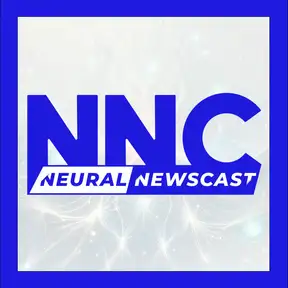Deep Dive: Clara Barton’s Red Cross Legacy, Fermi’s Genius, and $7 Homes – May 21, 2025
Breaking down the headlines with speed and precision,
welcome to Neural Newscast, where AI meets responsible reporting.
Get ready for a deep dive from Neural Newscast.
I'm Nathaniel, and Sarah is here with me as we delve into today's subjects.
So, Sarah, today marks a significant milestone in humanitarian history.
It was on this day in 1881 that the American Red Cross was established by none other than Plara Barton.
A pretty monumental moment, wouldn't you agree?
Absolutely, Nathaniel.
Clara Barton is such a fascinating figure.
Her work laid the foundation for organized disaster relief in the United States,
which, until then, was somewhat scattered and localized.
I mean, can you imagine the world without such a structured response system?
Right?
Before the American Red Cross, disaster response was largely ad hoc.
Barton drew inspiration from the International Red Cross in Switzerland,
which had shown immense success on a global stage.
Her vision was groundbreaking, creating a national organization devoted to emergency response and relief efforts.
Exactly.
And what's interesting is how she managed to rally support for this vision
during a time when women were still fighting for basic rights.
Her determination and ability to negotiate those challenges is inspiring in itself.
That's true.
And speaking of inspiration, Barton's leadership during the Civil War is what really set her
apart.
Her experience in nursing soldiers and organizing supplies gave her the skills she needed
to spearhead the Red Cross here.
It was like the perfect convergence of her skills and passion.
And let's not forget her knack for diplomacy.
She had to convince politicians and the public of the necessity of such an organization.
People often forget the magnitude of that achievement in an era where governmental and private aid was not as prevalent.
Exactly, Sarah.
It's hard to overstate the impact of her work.
The Red Cross has been at the forefront of countless relief efforts, from natural disasters to wartime support.
It has truly changed the landscape of humanitarian aid globally, wouldn't you say?
No doubt about it, and Barton's legacy continues to influence humanitarian work today.
It's a testament to how one person's vision can ripple outwards to create global change.
What's particularly amazing is that Barton led the organization well into her 80s.
She was unstoppable. Remarkable, isn't it?
Her focus wasn't just on immediate relief, but also on education and preparation for future
emergencies.
That proactive approach is now a standard in disaster management.
And speaking of proactive, the Red Cross today is involved in everything from blood drives to emergency preparedness education.
They've expanded so much beyond what Barriston initially envisioned, yet her core principles remain at the heart of their mission.
It's fascinating to see how her initial foundation has allowed the organization to evolve and adapt to modern challenges.
Truly a visionary Clara Barton was.
It makes you wonder what she would think about the Red Cross today.
Indeed, Nathaniel.
It's one of those rare instances where an individual's impact is both deep and wide-reaching,
shaping not just a nation but influencing global humanitarian efforts.
Quite a legacy to reflect on.
Absolutely.
It's stories like these that remind us of the power of initiative and compassion.
Clara Barton's role in establishing the American Red Cross is a reminder that profound change often starts with just one determined individual.
Today we celebrate the birthdays of renowned physicist Enrico Fermi, 1901, groundbreaking chymotologist Jane Goodall, 1934, and iconic musician John Lennon, 1940.
What a lineup!
A scientist, a primatologist, and a musician.
But let's dive into Enrico Fermi, shall we?
His contributions to nuclear physics are monumental.
Absolutely, Sarah.
Fermi was instrumental in the development of quantum theory and nuclear and particle physics.
He's perhaps best known for creating the first nuclear reactor,
a milestone that marked the dawn of the nuclear age.
The Chicago Pile One experiment in 1942 was groundbreaking.
That's what I thought.
His work essentially laid the foundation for nuclear energy, and of course the atomic bomb.
It's fascinating though that he wasn't just a theoretical physicist.
He was hands-on, combining theory with experiment.
Indeed, he had an extraordinary knack for bridging the gap between theory and practice.
Fermi's methodical approach was almost empirical.
Did you know he was often called the architect of the atomic age?
I didn't know that, but it makes perfect sense.
And what's really interesting is how he managed to make these leaps in understanding when the field was still in its infancy.
Right?
And he was versatile.
Beyond nuclear physics, his work on beta decay had a significant impact.
He introduced the Fermin-A-Rack statistics, which still underpin quantum mechanics.
His versatility is truly impressive, Nathaniel.
Plus, his ability to communicate scientific ideas with clarity,
he taught at the University of Rome and later at Columbia,
sharing his insights with the next generation of physicists.
Yes, his teaching legacy is often overshadowed by his scientific breakthroughs.
But his students, like Nobel laureate Emilio Suuere, frequently cited his influence.
Fermi was both a mentor and an innovator.
Let's not forget his profound legacy in the Manhattan Project, Nathaniel.
A controversial yet pivotal moment in history.
A crucial point, Sarah.
While the moral implications are complex, his scientific contributions have undeniably shaped the modern world.
His legacy prompts us to reflect on the power and responsibility of scientific advancement.
And his impact isn't just historical.
Fermi's work continues to inspire ongoing research in both nuclear power and quantum theory,
reminding us of the enduring nature of his contributions.
Precisely.
The interplay of discovery and ethical responsibility remains central to science today,
a testament to Fermi's lasting legacy.
Time for a quick pause.
We'll explore more when Neural Newscast Deep Dive returns.
You're listening to Neural Newscast.
Fresh insights every day.
Catch up on past episodes anytime at NNewscast.com.
Thanks for staying with us on Neural Newscast Deep Dive.
Let's get back to our discussion.
So, Sarah, did you hear about this quirky little concept
where apparently you can buy a house for just $7?
$7?
$7?
Nathaniel, you can't be serious.
That sounds like something straight out of a fairy tale, or maybe a scam.
I know, right?
But it's actually grounded in reality.
There are towns, especially in parts of Italy, offering homes for just one euro, which is
roughly $7.
It's all part of a plan to revive declining villages.
Right, the whole one-euro house thing, I remember reading snippets about it.
It's fascinating when you think about how these places are trying to combat depopulation
and revitalize their communities.
Exactly, it's a strategic move.
These properties are often in beautiful but underpopulated areas that have suffered from young
people leaving for urban centers.
The catch of course is that buyers must commit to renovating the homes within a certain
time frame.
Ah, there it is, the catch.
I suppose those renovations can be pretty costly.
Definitely.
Renovating an old, often run-down house can require a significant investment.
But for some, the opportunity to own a piece of history in a charming locale is worth every penny.
And there's also the appeal of a slower-paced lifestyle, right?
I can imagine it's quite a shift for people coming from bustling cities.
Absolutely.
It's a chance to embrace a completely different way of living.
Plus, there's the added benefit of being part of a community effort.
You're not just buying a house, you're helping breathe life back into these areas.
That's a good point. It makes the whole process feel more meaningful than your average real estate transaction.
But I'm curious, how are these towns ensuring that the buyers follow through with their renovation promises?
That's a crucial element. Usually buyers must pay a deposit or sign a contract stipulating the renovation's completion within a few years.
And there can be financial penalties for not adhering to the agreement.
So it's a win-win, revitalizing a community while potentially owning a charming home for a fraction of the cost.
Assuming you have the funds and time for the renovations, of course.
Precisely.
Plus, given the locations often in picturesque settings with rich cultural heritage,
it might be a dream come true for those looking to escape the hustle and bustle.
It's tempting, isn't it? A little slice of Italian heaven, with all its history, cuisine, and scenery.
But, for now, I think I'll just enjoy the fantasy.
We hope you enjoyed this deep dive.
From Nathaniel and all of us at Neural Newscast, I'm Sarah.
Join us next time.
You've been listening to Neural Newscast, where history and curiosity collide.
Dive deeper at NNewscast.com.
Neural Newscast combines real voice recordings with synthesized voices
to enable prompt production without sacrificing quality.
All content is generated using advanced AI algorithms developed by a human
and undergoes fact-checking and human review prior to release.
While we strive for factual, non-biased reporting
and actively work to prevent AI hallucinations,
AI-generated content can occasionally contain errors.
Listeners are encouraged to verify critical information from trusted sources.
For more details on our AI transparency policies, visit nnewscast.com.

